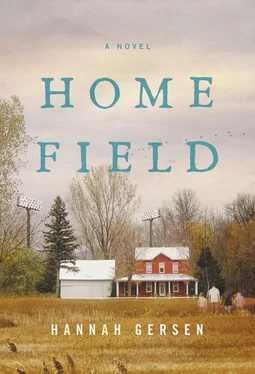“We’ve all been praying for you. It just breaks my heart.” Mrs. Baker’s eyes began to fill, and she shook her head.
Stephanie nodded, not knowing how to reply. This was the exact reason she had been avoiding coming to church.
“There’s a very good cobbler,” Mrs. Baker said, quickly recovering her composure. “The peaches are exceptional this year.”
The peaches are always exceptional, Stephanie thought, sourly, but when she got to the table, she chose the cobbler, taking a big gooey bite. Bits of streusel topping clung to the tines of her fork and she licked them off. She thought this cloudy feeling might be a hangover. Before last night, she’d never really gotten drunk. She took another bite of cobbler, one with a big slice of peach, and all at once she remembered why people felt the need to say, every year, that the peaches were exceptional . Because they just were. And they didn’t last. You had two, maybe three weeks to eat them. She remembered a time when she and her mother bought peaches on a whim. It was just the two of them, and they were driving home from somewhere when her mother stopped at a roadside stand and bought a bag of peaches, which Stephanie held in her lap in the front seat, the paper bag warm from the sun. “Mmm, I can smell those peaches!” her mother said, as they drove along. And then, all of a sudden, she pulled over to the side of the road. “I have to eat one now! I can’t wait!” And so the two of them had sat there, eating peaches in the car with the windows rolled down and the juice dripping between their fingers. And Stephanie remembered her mother saying, “These really are the best peaches in the world. No one can say they’ve ever had a better peach.” It was kind of a silly thing to say, but it had made her life feel big. Her mother could do that; she could isolate a moment and make it stand out.
“You were hungry,” her father observed.
“Yeah, I guess.” Stephanie was surprised and a little embarrassed to see that the cobbler was already gone. “Where are Robbie and Bry?”
“They probably went outside with the other kids.”
“I’ll go find them.”
“You don’t have to.”
“I want to.” She suspected her father would like to escape, too, but he couldn’t go outside and be a part of the kid world, the way she still could.
In the foyer she ran into a clique of girls slightly younger than she was, decked out in their new back-to-school clothes. They were dressed up more than they needed to be. Stephanie paused to reflect on which was the more un-Christian behavior, their vanity or her judgment of their vanity. In the midst of this private debate, Pastor John approached her. She liked him, even though she didn’t believe in what he was selling. And she suspected he knew that. But he never made her feel bad. Even this morning, as she stood here hungover, judgmental, with cobbler crumbs on her shirt, she felt her own goodness in his smile.
“It’s nice to see you, Stephanie,” he said. “I know you’re busy getting ready for college. When do you leave?”
“Next Saturday.”
“Less than a week,” he said. “Are you excited?”
“Yeah. I mean, I think so.”
“You know you always have your family here, but I hope you find a new church family at Swarthmore.”
“I’ll try.”
“Just keep it in mind,” he said, not taking her white lie personally. He never took offense. That was what made him such a good pastor. She would be religious if it meant being that objective all the time, but in her experience, most religious people were not like Pastor John.
Outside, she looked for her friends in the side yard, but there were just a bunch of middle-school kids sitting at the picnic tables. She waved to Robbie and Bry, who were playing with Bry’s rubber-band ball, bouncing it high in the parking lot. She was hoping they would invite her to join them, but they only gave her a nod. She stood near the church’s stone wall, feeling like a real prisspot, the kind of girl who took it upon herself to be a playground monitor.
The kids moved from the picnic table to the row of pine trees that bordered the cemetery. Stephanie longed to join them, to sit in the shade on the soft orange carpet of dead pine needles, to smell the sharp piney smell, to hear the wind in the higher branches. Lately she had the sense that growing up meant trading in all the haphazard sensual pleasures of childhood for — what? Sex? She doubted that could make up for the loss. She stepped into a block of shade cast by the church and so narrow at this time of day that she had to lean against the stones to feel its coolness.
All the graves at the front of the cemetery were old, dating back to the nineteenth century, their headstones slanted and engraved with names no one went by anymore, although some of the surnames were still in use. Her mother’s maiden name, Bowers, wasn’t there, but her first married name, Shank, was on several headstones. Stephanie had changed her last name from Shank to Renner when her father had adopted her — or rather, Stephanie’s mother had changed it. Apparently Stephanie had approved, but she couldn’t remember. She kept Shank as a second middle name after Geneva, which was her maternal grandmother’s first name. Stephanie sometimes thought of how both the Shank and the Renner would drop off when she got married. If she got married. She’d never had a boyfriend.
Her mother had always had boyfriends. She had never really been single. It was as if she had to die to be alone.
Her mother wasn’t buried in this cemetery. There wasn’t room. And anyway, her grandmother — Geneva — had a little cemetery on her farm. There was also a spot next to her biological father in a completely different cemetery. That had been a debate with her paternal grandparents— the Shanks, as everyone in her mother’s family referred to them. They pushed for her mother to be buried in the Shank family plot, next to Sam. They talked about how it was “prepurchased,” so it shouldn’t go to waste. An odd argument, especially since the Shanks were practically rich. Her father joked that it was a “sunk cost.” That he was able to joke was simultaneously upsetting and reassuring to Stephanie. In the end, he let Geneva decide, and of course she chose to bury Stephanie’s mother on the farm.
The graveside service was awkwardly cramped, with the Shanks off in the long grasses in the corner, probably getting ticks. Stephanie worried about the Shanks. Everyone thought they were so uncaring, but she saw their vulnerability. Offering a gravesite was their clumsy way of being helpful. They didn’t mean to be annoying; they were just the kind of people who always seemed liked they were butting in. Stephanie wondered what had really happened between them and her mother after Sam died. She’d heard different versions of the story, but what it came down to — according to her mother — was that the Shanks disapproved of her second marriage. And her mother had been hurt by their judgment. And then the Shanks had moved away and that had somehow frozen the relationship, so that both parties remembered only the resentment, not the attachment that must have preceded it.
For a few years, the Shanks continued to visit on holidays — Stephanie had the photos, if not the memories — but after Robbie and Bry were born, the Shanks must have felt left out. Or maybe they had no interest in her new brothers. All Stephanie knew was that they stopped visiting, and it was up to her mother to take her for visits. Which she did, at Christmas and Easter. But it was always so stilted and overly formal that as soon as Stephanie was old enough to say no, she would rather not go, she did. And her mother let her get away with that. From age eleven to seventeen, Stephanie didn’t see her grandparents. Stephanie felt guilty about that now, but it was a guilt mixed with anger. Because why didn’t her grandparents insist? Stephanie’s mother said they were workaholics, and that their marriage had gone bad a long time ago. They were unhappy.
Читать дальше












